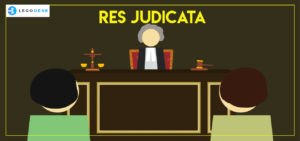What is Res Judicata ?
What is the Doctrine of Res Judicata
Res Judicata is a Latin term which means ‘a matter already judged’. In general, a court will not entertain a matter which has been already adjudged between the same parties. Also, such matter is no longer subject to appeal. Section 11 of Code of Civil procedure,1908 embodies Doctrine of Res judicata or rule of conclusiveness in India. It states that no court shall try a suit or issue in which issue directly and substantially is the same as the earlier suit, between the same parties or their representatives and for the same relief. Further, the earlier suit must be adjudged by the competent court and no longer subject to appeal. This doctrine was accepted in all civilized legal systems.
In India, The Doctrine of Res judicata as explained in case of Satyadhyan Ghosal v. Deorjin Debi[1], by Das Gupta, Justice; as,
” The principle of res judicata is based on the need of giving finality to judicial decisions. What it says is that once a res is judicata, it shall not be adjudged again. Primarily it applies as between past litigation and future litigation. When a matter, whether on a question of fact or a question of law, has been decided between two parties in one suit and the decision is final, either because no appeal was taken to higher court or because the appeal was dismissed, or no appeal lies, neither party will be allowed in a future suit.”
Nature and Scope of Res Judicata
“Res” means “subject matter” and “Judicata” means “decided”. This doctrine is formed in the larger public interest and it requires that all litigation, sooner or later, must come to an end[2]. This principle is based on justice, equity and good conscience. Means, if a party who has succeeded once in a suit, should not be harassed in the further proceeding involving the same issue. Res judicata strives to strike a balance between two pits, first the efficiency of the judicial system by providing final judgment. whereas, second, it protects the parties’ interests and rights which have been decided already. Section 11 of the code contains the principle of public policy in statutory form. it embodies the rule of conclusiveness and operates as a bar to try the same issue twice.
The objective of Res Judicata
This Doctrine is based upon three Latin maxims
(a) nemo debet bis vexari pro una et eadem causa;
meaning thereby, no man should be vexed twice for the same cause. for example, if a person was convicted by the competent authority, the same person could not be brought in front of the court in subsequent proceedings.
(b) interest reipublicae ut sit finis litium;
it is in the interest of the state that there should be an end to litigation. The contrary will result in overburden the judiciary which will hamper the efficient working.
(c) res judicata pro veritate occipitur;
a judicial decision must be accepted as correct. Otherwise, the credibility of the judicial system will degrade and there will be no finality to any suit.
Thus, this doctrine is a combined result of the public policy which reflects in maxim (b) and (c) and privacy policy in maxim (a). This Doctrine applies to all the proceedings whether criminal or civil. Without this rule, there would be no end to litigation and the rights of a human being would be involved in endless confusion and injustice did undercover. In the absence of this Doctrine, there would be no end to litigation. Hence, a rich and malicious person will vex a poor opponent by repetitive suit resulting in relinquishing his rights.
Extent and Applicability of res judicata
The Doctrine of res judicata is a fundamental concept based on public and private interests. It simply seeks that every litigation must come to an end. Therefore, it applies to the civil suit, execution proceedings, arbitration proceedings, taxation matters, industrial adjudication, writ petitions, administrative orders, interim orders, criminal orders, etc. Thus, Section 11 of the Civil Procedure Code which lays the doctrine of res judicata is exhaustive in nature.
[1] AIR 1960 SC 941
[2]Lal Chand v. Radha Krishna (1977) 2 SCC 88
Try our Debt Resolution solutions today Request a Demo

Gud job please post material about Muslim personal law